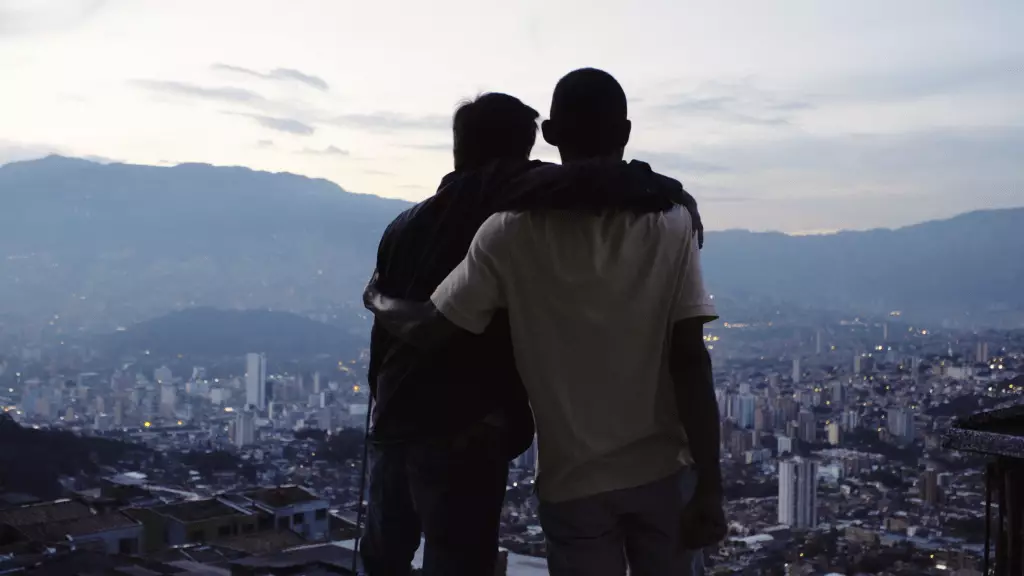Today marks a significant moment in Colombia, as a documentary highlighting the profound reconciliation between two sons—Sebastián Marroquín, the son of notorious drug lord Pablo Escobar, and Jorge Lara, the son of slain politician Rodrigo Lara—receives its special screening in Bogotá. This compelling documentary, titled *Lara: The Man Who Tried to Save Colombia*, is not just about personal reconciliations but also addresses the larger socio-political landscape that surrounds the lives of these men. This screening coincides with the somber 41st anniversary of Rodrigo Lara Bonilla’s assassination, an event that has defined Colombia’s turbulent history and remains a poignant reminder of the violence perpetuated by the drug trade.
Organized by the Jorge Lara Restrepo Foundation in conjunction with Universidad Externado de Colombia, this event has drawn distinguished attendees, including family members of the Lara family, high-profile politicians, and representatives from several embassies. The presence of these dignitaries highlights the film’s capacity to transcend personal narratives and underscore the grand narrative of Colombia’s struggle with drug-related violence and governmental corruption.
More Than Just a Story of Revenge
At its core, *Lara: The Man Who Tried to Save Colombia* weaves a dual narrative that is as tragic as it is inspiring. Initially, Jorge Lara was consumed by a desire for revenge following his father’s death at the hands of Escobar’s criminal network. However, fate intervened, and through a remarkable series of circumstances, Jorge found himself in a position to reconcile with Marroquín. This personal saga invites viewers to reflect on the complexities of forgiveness and the human capacity to rise above hatred, making the film a powerful commentary not only on personal grief but on societal healing.
Filmmaker and documentarian Gavan, who has dedicated over a decade to unraveling this narrative, poignantly states that the screening acts as a clarion call to the Colombian government and judicial systems. It is a demand for accountability surrounding the unsolved murder that continues to haunt the Lara legacy. Jorge’s tragic death during the creation of the film itself adds a haunting layer of urgency to this narrative. He held onto his father’s written notes, containing names of individuals he believed were interconnected with the drug trade—a clue that may hold the answers to lingering questions of justice.
A Journey Through Systemic Failures and Corruption
The emotional weight of this documentary is compounded by the critiques it levies against Colombia’s justice system. Co-founders Lina and Carolina Flórez García assert that the film goes beyond mere storytelling; it is an act of resistance against the systemic failures that have allowed the truth about Rodrigo Lara’s death to remain obscured. They highlight how these failures have perpetuated a culture of corruption and impunity, where justice is a rare commodity, especially for those caught in the crosshairs of violence.
This documentary addresses what it means to confront the painful legacy of violence while seeking paths of reconciliation. By humanizing these interconnected narratives of loss and forgiveness, the film challenges viewers to consider their roles in a society that often opts for silence over truth. The exploration of reconciliation in the context of Colombia’s troubled past invites a broader dialogue about societal healing in spaces burdened by historical injustices.
Significance of Global Participation
The screening of this landmark film in the very city where Rodrigo Lara lost his life imbues the event with an extraordinary poignancy. Simon Cox, EVP Content & Acquisitions at Banijay Rights, notes this as a unique reconciliation tale, celebrated by family, friends, and associates coming together in a historically charged location. Such unity among diverse attendees—from family members to international dignitaries—signals a collective yearning for healing and a commitment to honor those lost in the turmoil of violence.
In a world that often seems fractured by hatred and division, *Lara: The Man Who Tried to Save Colombia* stands as a beacon of hope. The film is an invitation to foster conversations about forgiveness that transcend borders, echoing the urgent need for justice and accountability in a society still grappling with the shadows of its past. This groundbreaking documentary offers not only a narrative of reconciliation but also embodies the resilience and courage that is essential for healing a nation deeply scarred by violence.

